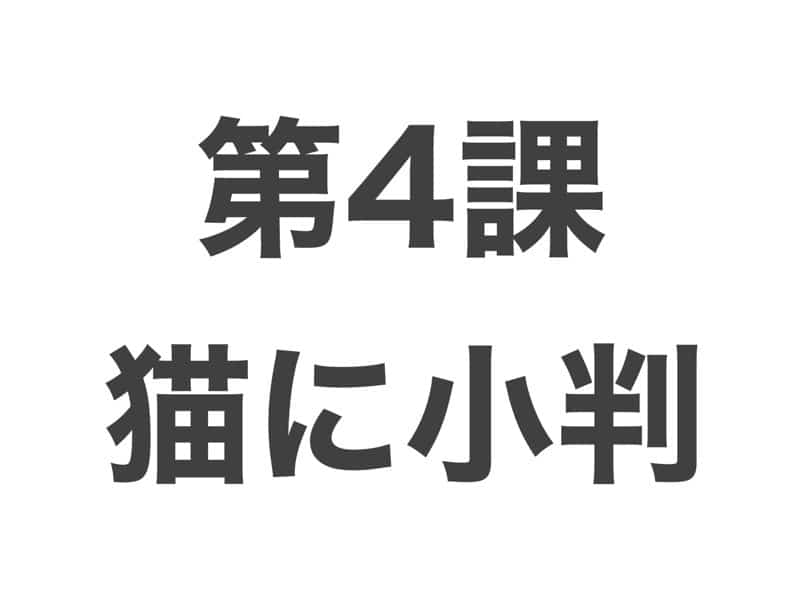新しい言葉
| ことわざ | Proverb |
| 目が回る | To be dizzy (or overwhelmed, extremely busy) |
| 手を借りる | To ask for help |
| それほど〜ない | Not that much / Not so much |
| 役に立つ | To be useful / To be of help |
| のんびりする | To relax / To take it easy |
| 昼寝 | Nap |
| つい | Without thinking / Accidentally / Unintentionally |
| 口に出す | To say aloud / To speak out |
| また | Again / Moreover / Also |
| 額 | Forehead |
| たとえる | To compare |
| 小判 | A gold coin (historically used in Japan) |
| 手にする | To obtain / To get in hand |
| 価値 | Value / Worth |
| 手に入れる | To obtain |
| うまい | Skillful / Good at |
| ずっと | For a long time |
| 使い続ける | To continue using |
| きっと | Surely / Certainly / I’m sure |
| ぜひ | Definitely / Please do |
いっしょに考えましょう
- What kind of animal do you think a dog is?
- How about a cat?
- What kind of animal do you consider to be a bad animal?
読みましょう
In Japan, there are many proverbs. Among them, those using animals are probably the most interesting. Let me introduce a few proverbs that use ”cats.” When you’re so busy that your head is spinning and you want someone to help, it’s said that ”猫の手も借りたいほどだ (you would even want to borrow a cat’s paw).” Even if the cat helped, it probably wouldn’t be very useful. A person, busy working, seeing a cat leisurely napping, would probably said this out loud in frustration. Also, when you want to say “My house isn’t large but has a garden”, you would say “猫の額ほどの庭があります (I have a garden as big as a cat’s forehead).” Since a cat’s forehead is considered to be small, the small size of land is compared to the size of ”a cat’s forehead.”
There is also the saying “猫に小判 (giving a cat gold).” A koban is an old coin made of gold, and it was something that ordinary people could hardly get their hands on, so it was considered valuable. The saying “猫に小判” means that no matter how valuable the gold is, it is useless to a cat who doesn’t understand its worth. For example, if you get an expensive camera costing tens of thousands of yen but can’t use it well, people might say it’s like “猫に小判.”
Not only cats, but also animals such as dogs, cows, and horses, which have lived alongside humans for a long time, are used in sayings and proverbs and these have been used for many years. By using proverbs and comparisons, it is easy and fun to convey meaning, and it’s a convenient way of speaking. I believe there are similar proverbs and comparisons in your culture as well. Please introduce them.
答えましょう
- What kind of proverb does the author find interesting?
- When you’re very busy and want someone to help you, what do you say?
- How do we express that the land is narrow?
- What does “小判” (kobang) refer to?
- What does the phrase “猫に小判” (neko ni koban) mean?
- When might someone be told this?
- Apart from cats, which other animals are used in proverbs or metaphors?
- What kind of animals are they?
- Why are proverbs or metaphors convenient?
使いましょう
まとめましょう
- What proverbs or comparisons are introduced in this text?
- Choose one and explain its meaning and usage.
- Why have proverbs and comparisons been used for such a long time?
話しましょう
- Have you heard of other examples of Japanese expressions? What do they mean? Would you like to learn more?
- What animals are commonly used in proverbs and comparisons? Can you give some examples of how they are used? What do they mean? When are they typically used?






コメント